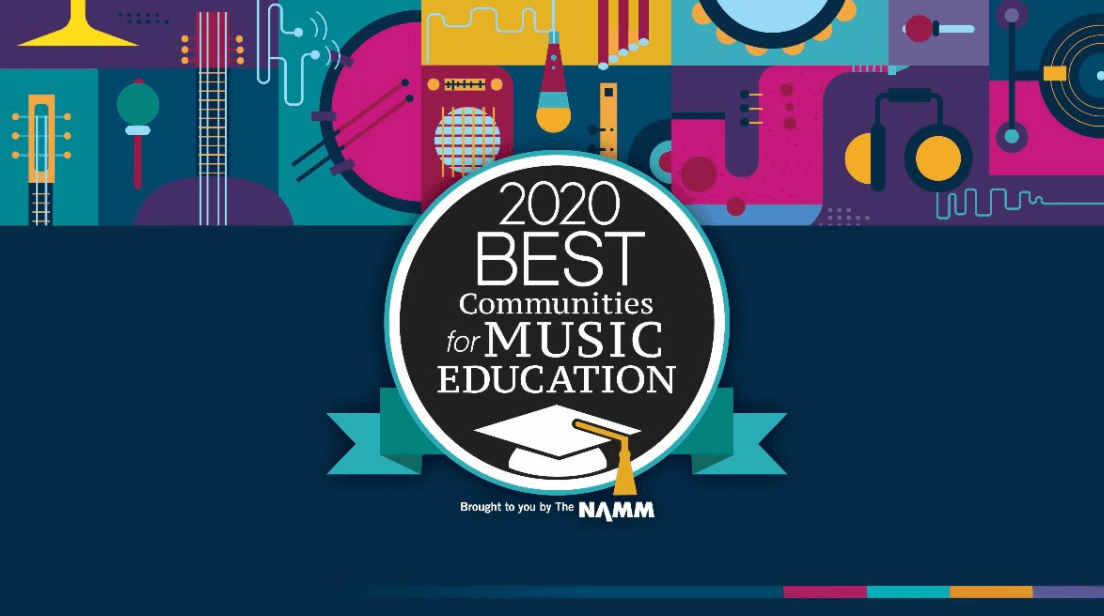
While schools across the nation remain closed to slow the spread of COVID-19, the joyous sounds of music continue to ring out as districts and schools celebrate their recognition as “Best Communities for Music Education.”
Now in its 21st year and presented by the National Association of Music Merchants (NAMM) Foundation, the Best Communities for Music Education (BCME) program has recognized 754 school districts across 42 states and 148 schools for the outstanding efforts by teachers, administrators, parents, students, and community leaders and their support for music education as part of a well-rounded education for all children.
“Even in this time of uncertainty, the Best Community districts and SupportMusic schools show what can be done when teachers, school and community leaders, and parents all agree that music is essential and not optional as a learning force that must be available to all students,” affirmed Mary Luehrsen, executive director of The NAMM Foundation. “More so now than ever and as evident by the creative music learning by both teachers and students that continues from home and online, music education plays a crucial role in students’ social and emotional connections to each other and the community.”
In cooperation with researchers at The Music Research Institute at the University of Kansas, the BCME program evaluates schools and districts based on funding, staffing of highly-qualified teachers, commitment to standards, and access to music instruction. The application period begins in October, with districts and schools announced in the following spring. This year, the COVID-19 pandemic has seen many schools continue their commitment to music education, albeit virtually.
In New Jersey, Livingston Public Schools, a four-time BCME recipient is one school continuing its commitment to music education. The district, which serves students K-12 with choir, band, and orchestra programs, shared that the number of students enrolled in ensembles increases annually, and engagement is critical. “Being named a Best Community for Music Education from The NAMM Foundation celebrates our district’s commitment to music education, and the dedication of Livingston’s music teachers, administrators, students, parents, Board of Education, and community members to a comprehensive K-12 music program for all students,” said Mara Rubin, Supervisor of Visual and Performing Arts. “And now, music is even more important for our students and community during these uncertain times in which we are living because music helps to keep communities together. We are reminded that music creates a sense of belonging and participation, enhancing our community connections, and building our community’s spirit.”
In Southern California, San Marcos School District is a three-time BCME recipient. Music teacher Matt Armstrong shared that both teachers and administrators jumped into action to navigate the state-mandated closure and to keep students involved in music-making. For elementary students, music educators launched “Start with the Arts” day on Mondays. “We wanted to focus on family engagement and enjoyment through the arts keeping our elementary students involved with as much as we can.”
Across the district, middle school and high school twice-weekly classes let students continue to rehearsing and learning while keeping in touch with friends. One music teacher developed a district-wide practice challenge, where students could submit their videos, allowing them to see other students play from across all grade levels—another organized masterclasses for the district. One teacher creates entirely produced daily updated videos, and the elementary team collaborated to launch a virtual choir of the song, “What the World Needs Now,” in tribute to healthcare professionals. Armstrong says that of the thousands of music students across the district, approximately 95% of students tune in for music classes. “Students are hungry for music. We can’t make music together right now, but allowing them to continue to enjoy the music-making process is powerful, and it wouldn’t be possible without the support of our administrators, teachers, community, and students.”
In addition to the 754 districts receiving Best Communities for Music Education recognition, 148 individual schools across the nation are being awarded the SupportMusic Merit Award (SMMA), which recognizes support for school-based music education programs.
At Josiah Quincy Elementary School in Boston, Massachusetts, a two-time SMMA winner, the school staff knew that arts programming would be important to cohesion and continued student success. Arts coordinator Christopher Schroeder said that, “In the first week of the closure, our music staff quickly mobilized and launched an online website to adapt our daily music programming. Our students have access to the following online opportunities: virtual music lessons led by 28 teaching artists; daily morning music huddles to keep our students socially connected; music worksheets to strengthen students’ music literacy and theory; remote instrument support with tuning and instrument care support, and a curated list of music tech apps that are free or low-cost to most families.”








